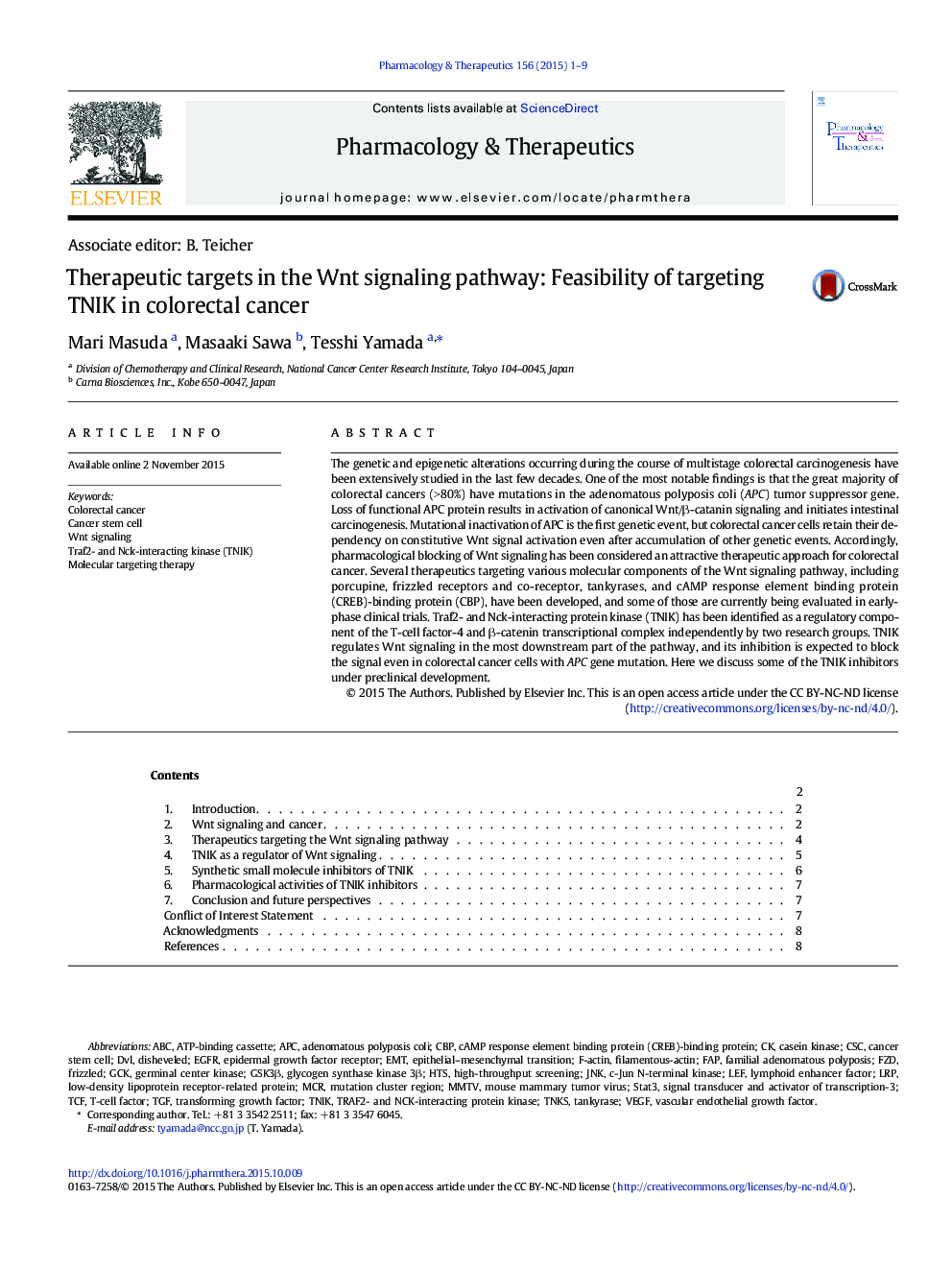| کد مقاله | کد نشریه | سال انتشار | مقاله انگلیسی | نسخه تمام متن |
|---|---|---|---|---|
| 5843915 | 1560949 | 2015 | 9 صفحه PDF | دانلود رایگان |
عنوان انگلیسی مقاله ISI
Therapeutic targets in the Wnt signaling pathway: Feasibility of targeting TNIK in colorectal cancer
دانلود مقاله + سفارش ترجمه
دانلود مقاله ISI انگلیسی
رایگان برای ایرانیان
کلمات کلیدی
GCKMutation cluster regionTNKSfrizzledFZDfilamentous-actinMMTVFAPGSK3βTGFABCCBPAPCTCFF-actinDVLJnkEGFRLRPCSCSTAT3HTSMCRc-Jun N-terminal kinase - C-Jun N-terminal kinaseFAP, Familial Adenomatous Polyposis - آدنوماتوز پلی پوز خانوادگیadenomatous polyposis coli - آدنوماتوز پولیپوزیس کولی یا آدنوماتوس پولیپوزیس کولای disheveled - بی رحمTankyrase - تانکیرازtransforming growth factor - تبدیل فاکتور رشدEMT - تکنسین فوریتهای پزشکیMolecular targeting therapy - درمان اختصاصی مولکولیTNIK - دفتر خاطرات روزانهColorectal cancer - سرطان روده بزرگcancer stem cell - سلولهای بنیادی سرطانیWnt signaling - سیگنال WntT-cell factor - عامل T-celllymphoid enhancer factor - عامل افزایش دهنده لنفاویhigh-throughput screening - غربالگری بالاVascular endothelial growth factor - فاکتور رشد اندوتلیال عروقیVascular Endothelial Growth Factor (VEGF) - فاکتور رشد اندوتلیال عروقی (VEGF)Lef - لفSignal transducer and activator of transcription-3 - مبدل سیگنال و فعال کننده رونویسی 3Mouse mammary tumor virus - ویروس تومور پستان موشLow-density lipoprotein receptor-related protein - پروتئین مرتبط با گیرنده های لیپوپروتئین کم چگالیcasein kinase - کازئین کینازATP-binding cassette - کیت اتصال به ATPEpithelial–mesenchymal transition - گذار اپیتلیال-مزانشیمیGlycogen synthase kinase 3β - گلیکوزین سنتاز کیناز 3βEpidermal growth factor receptor - گیرنده فاکتور رشد اپیدرمال
موضوعات مرتبط
علوم پزشکی و سلامت
داروسازی، سم شناسی و علوم دارویی
داروشناسی
پیش نمایش صفحه اول مقاله

چکیده انگلیسی
The genetic and epigenetic alterations occurring during the course of multistage colorectal carcinogenesis have been extensively studied in the last few decades. One of the most notable findings is that the great majority of colorectal cancers (>80%) have mutations in the adenomatous polyposis coli (APC) tumor suppressor gene. Loss of functional APC protein results in activation of canonical Wnt/β-catanin signaling and initiates intestinal carcinogenesis. Mutational inactivation of APC is the first genetic event, but colorectal cancer cells retain their dependency on constitutive Wnt signal activation even after accumulation of other genetic events. Accordingly, pharmacological blocking of Wnt signaling has been considered an attractive therapeutic approach for colorectal cancer. Several therapeutics targeting various molecular components of the Wnt signaling pathway, including porcupine, frizzled receptors and co-receptor, tankyrases, and cAMP response element binding protein (CREB)-binding protein (CBP), have been developed, and some of those are currently being evaluated in early-phase clinical trials. Traf2- and Nck-interacting protein kinase (TNIK) has been identified as a regulatory component of the T-cell factor-4 and β-catenin transcriptional complex independently by two research groups. TNIK regulates Wnt signaling in the most downstream part of the pathway, and its inhibition is expected to block the signal even in colorectal cancer cells with APC gene mutation. Here we discuss some of the TNIK inhibitors under preclinical development.
ناشر
Database: Elsevier - ScienceDirect (ساینس دایرکت)
Journal: Pharmacology & Therapeutics - Volume 156, December 2015, Pages 1-9
Journal: Pharmacology & Therapeutics - Volume 156, December 2015, Pages 1-9
نویسندگان
Mari Masuda, Masaaki Sawa, Tesshi Yamada,